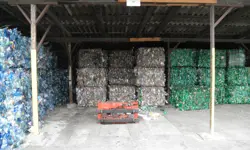
An appetite for oil
The idea for the Gobbler boat, an innovative, oil-spill retrieval vessel, was conceived in 2009 by Paul and Simon Jauncey, a father and son team from Portsmouth. They wanted to produce a cost-effective, highquality vessel that would be able to deal with the multiple scenarios resulting from oil spills. However, their goal is to not only deal with oil pollution within water, but also begin repairing river banks, land masses and vegetation affected by the pollution.
The Gobbler boat is ocean certified for offshore spills and can be installed on commercial shipping vessels but its size – 8.85 metres in length and a 450 millimetre draught – means that it can easily access shallow rivers and lakes, something that other oil-spill recovery vessels can find difficult. Research identified that these sorts of waterways often have serious oil pollution that has accumulated unaddressed for decades, especially in developing countries, including the Jaunceys’ first main target, Nigeria.
it can easily access shallow rivers and lakes, something that other oil-spill recovery vessels can find difficult
To recover oil, the vessel carries a heavyduty, aluminium oil skimmer that has two interchangeable modules; the main one features a recovery capacity of 40 tonnes per hour, while the second collects very light oils. Both deliver 98–100% water-free recovered oil that can be sold for profit, which is reinvested into the clean-up programme.
The skimmers are located at the front of the vessel and the recovered oil is pumped through the boat’s internal hoses to a bollard that is located on the aft deck. This is connected to a detachable bladder, which is available in different capacities to suit the location and trailed behind the boat. Once filled to capacity, the bladders are connected to a QuadPod or OctoPod, a floating pumping station, similar to a buoy, that can empty four or eight bladders into a ship or road tanker at up to 300 tonnes per hour. The bladders are reusable, and because the boat doesn’t carry any oil, it isn’t hampered by weight and is easily manoeuvrable.
To deal with riverbank and land pollution, the Gobbler engineers have adapted small hovercraft with equipment to spread a carpet of patented, lightweight, nontoxic, highly absorbent material that has been produced in-house from recycled newspaper and additives. The material does not absorb water, but quickly absorbs oil up to 20 times its own weight from beaches and riverbanks. Once harvested, this material becomes valuable biomass.
The material does not absorb water, but quickly absorbs oil up to 20 times its own weight from beaches and riverbanks
Paul and Simon have secured a contract to provide boats to the Federal Government of Nigeria to assist in the clean-up of Ogniland and surrounding areas in the Niger Delta floodplains, where wide-scale oil extraction has contaminated the environment. They have also set up a community interest company, Cleaner Seas, which aims to donate the boats and equipment to countries in need and train local people to operate and maintain the equipment.
A new facility to manufacture the boats will open in South Wales in January 2017 and the company also has a subsidiary in the USA that will soon be up and running. A further four facilities are planned to open in the UK by 2018.
For more information, see www.gobblerboats.com
***
This article has been adapted from "An appetite for oil", which originally appeared in the print edition of Ingenia 69 (December 2016).
Keep up-to-date with Ingenia for free
SubscribeRelated content
Environment & sustainability

The extreme engineering behind life on an Antarctic station
Antarctica is one of the most challenging environments on the planet, but of enormous scientific importance to humanity. Technology and engineering is essential to enable the British Antarctic Survey's researchers to pursue their science effectively in this awe-inspiring landscape.

Recycling household waste
The percentage of waste recycled in the UK has risen rapidly over the past 20 years, thanks to breakthroughs in the way waste is processed. Find out about what happens to household waste and recent technological developments in the UK.

Upgrade existing buildings to reduce emissions
Much of the UK’s existing buildings predate modern energy standards. Patrick Bellew of Atelier Ten, a company that pioneered environmental innovations, suggests that a National Infrastructure Project is needed to tackle waste and inefficiency.

Future-proofing the next generation of wind turbine blades
Before deploying new equipment in an offshore environment, testing is vital and can reduce the time and cost of manufacturing longer blades. Replicating the harsh conditions within the confines of a test hall requires access to specialist, purpose-built facilities.
Other content from Ingenia
Quick read

- Environment & sustainability
- Opinion
A young engineer’s perspective on the good, the bad and the ugly of COP27

- Environment & sustainability
- Issue 95
How do we pay for net zero technologies?
Quick read

- Transport
- Mechanical
- How I got here
Electrifying trains and STEMAZING outreach

- Civil & structural
- Environment & sustainability
- Issue 95